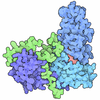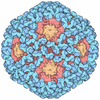[English] 日本語
 Yorodumi
Yorodumi- PDB-9gfa: Crystal structure of 14-3-3 sigma in complex with Tau pS214 pepti... -
+ Open data
Open data
- Basic information
Basic information
| Entry | Database: PDB / ID: 9gfa | ||||||
|---|---|---|---|---|---|---|---|
| Title | Crystal structure of 14-3-3 sigma in complex with Tau pS214 peptide and covalent stabilizer LD33 | ||||||
 Components Components |
| ||||||
 Keywords Keywords | PEPTIDE BINDING PROTEIN / 14-3-3 / tau / protein-protein interaction / covalent stabilization | ||||||
| Function / homology |  Function and homology information Function and homology informationplus-end-directed organelle transport along microtubule / histone-dependent DNA binding / negative regulation of protein localization to mitochondrion / neurofibrillary tangle / microtubule lateral binding / axonal transport / tubulin complex / positive regulation of protein localization to synapse / negative regulation of tubulin deacetylation / phosphatidylinositol bisphosphate binding ...plus-end-directed organelle transport along microtubule / histone-dependent DNA binding / negative regulation of protein localization to mitochondrion / neurofibrillary tangle / microtubule lateral binding / axonal transport / tubulin complex / positive regulation of protein localization to synapse / negative regulation of tubulin deacetylation / phosphatidylinositol bisphosphate binding / generation of neurons / regulation of epidermal cell division / protein kinase C inhibitor activity / rRNA metabolic process / axonal transport of mitochondrion / positive regulation of epidermal cell differentiation / keratinocyte development / regulation of mitochondrial fission / keratinization / axon development / regulation of chromosome organization / central nervous system neuron development / intracellular distribution of mitochondria / regulation of cell-cell adhesion / minor groove of adenine-thymine-rich DNA binding / lipoprotein particle binding / microtubule polymerization / negative regulation of mitochondrial membrane potential / regulation of microtubule polymerization / dynactin binding / cAMP/PKA signal transduction / Regulation of localization of FOXO transcription factors / main axon / apolipoprotein binding / keratinocyte proliferation / protein polymerization / axolemma / glial cell projection / Activation of BAD and translocation to mitochondria / Caspase-mediated cleavage of cytoskeletal proteins / phosphoserine residue binding / negative regulation of keratinocyte proliferation / regulation of microtubule polymerization or depolymerization / establishment of skin barrier / negative regulation of mitochondrial fission / negative regulation of protein localization to plasma membrane / neurofibrillary tangle assembly / Chk1/Chk2(Cds1) mediated inactivation of Cyclin B:Cdk1 complex / positive regulation of axon extension / SARS-CoV-2 targets host intracellular signalling and regulatory pathways / negative regulation of protein kinase activity / negative regulation of stem cell proliferation / regulation of cellular response to heat / synapse assembly / Activation of AMPK downstream of NMDARs / RHO GTPases activate PKNs / SARS-CoV-1 targets host intracellular signalling and regulatory pathways / positive regulation of superoxide anion generation / regulation of long-term synaptic depression / positive regulation of protein localization / cellular response to brain-derived neurotrophic factor stimulus / supramolecular fiber organization / cytoplasmic microtubule organization / somatodendritic compartment / regulation of calcium-mediated signaling / axon cytoplasm / positive regulation of microtubule polymerization / astrocyte activation / phosphatidylinositol binding / positive regulation of cell adhesion / stress granule assembly / nuclear periphery / protein sequestering activity / negative regulation of innate immune response / TP53 Regulates Transcription of Genes Involved in G2 Cell Cycle Arrest / protein phosphatase 2A binding / regulation of microtubule cytoskeleton organization / protein export from nucleus / release of cytochrome c from mitochondria / stem cell proliferation / positive regulation of protein export from nucleus / TP53 Regulates Metabolic Genes / cellular response to reactive oxygen species / Translocation of SLC2A4 (GLUT4) to the plasma membrane / Hsp90 protein binding / microglial cell activation / cellular response to nerve growth factor stimulus / synapse organization / protein homooligomerization / PKR-mediated signaling / regulation of synaptic plasticity / response to lead ion / SH3 domain binding / microtubule cytoskeleton organization / memory / intrinsic apoptotic signaling pathway in response to DNA damage / cytoplasmic ribonucleoprotein granule / neuron projection development / intracellular protein localization / cell-cell signaling Similarity search - Function | ||||||
| Biological species |  Homo sapiens (human) Homo sapiens (human) | ||||||
| Method |  X-RAY DIFFRACTION / X-RAY DIFFRACTION /  SYNCHROTRON / SYNCHROTRON /  MOLECULAR REPLACEMENT / Resolution: 1.6 Å MOLECULAR REPLACEMENT / Resolution: 1.6 Å | ||||||
 Authors Authors | van den Oetelaar, M.C.M. / Engelen, S.F.H. / Ottmann, C. / Brunsveld, L. | ||||||
| Funding support |  Netherlands, 1items Netherlands, 1items
| ||||||
 Citation Citation |  Journal: To Be Published Journal: To Be PublishedTitle: Site-selective stabilization of the 14-3-3/tau protein-protein interaction Authors: Oberheide, A.O. / van den Oetelaar, M.C.M. / Scheele, J.J.A. / Engelen, S.F.H. / Cossar, P. / Ottmann, C. / Brunsveld, L. | ||||||
| History |
|
- Structure visualization
Structure visualization
| Structure viewer | Molecule:  Molmil Molmil Jmol/JSmol Jmol/JSmol |
|---|
- Downloads & links
Downloads & links
- Download
Download
| PDBx/mmCIF format |  9gfa.cif.gz 9gfa.cif.gz | 67.7 KB | Display |  PDBx/mmCIF format PDBx/mmCIF format |
|---|---|---|---|---|
| PDB format |  pdb9gfa.ent.gz pdb9gfa.ent.gz | Display |  PDB format PDB format | |
| PDBx/mmJSON format |  9gfa.json.gz 9gfa.json.gz | Tree view |  PDBx/mmJSON format PDBx/mmJSON format | |
| Others |  Other downloads Other downloads |
-Validation report
| Summary document |  9gfa_validation.pdf.gz 9gfa_validation.pdf.gz | 848.4 KB | Display |  wwPDB validaton report wwPDB validaton report |
|---|---|---|---|---|
| Full document |  9gfa_full_validation.pdf.gz 9gfa_full_validation.pdf.gz | 849.3 KB | Display | |
| Data in XML |  9gfa_validation.xml.gz 9gfa_validation.xml.gz | 14.7 KB | Display | |
| Data in CIF |  9gfa_validation.cif.gz 9gfa_validation.cif.gz | 20.4 KB | Display | |
| Arichive directory |  https://data.pdbj.org/pub/pdb/validation_reports/gf/9gfa https://data.pdbj.org/pub/pdb/validation_reports/gf/9gfa ftp://data.pdbj.org/pub/pdb/validation_reports/gf/9gfa ftp://data.pdbj.org/pub/pdb/validation_reports/gf/9gfa | HTTPS FTP |
-Related structure data
| Related structure data |  9fs4C  9fvgC  9fvhC  9fviC  9fvnC  9fvpC C: citing same article ( |
|---|---|
| Similar structure data | Similarity search - Function & homology  F&H Search F&H Search |
- Links
Links
- Assembly
Assembly
| Deposited unit | 
| ||||||||
|---|---|---|---|---|---|---|---|---|---|
| 1 |
| ||||||||
| Unit cell |
|
- Components
Components
| #1: Protein | Mass: 26558.914 Da / Num. of mol.: 1 Source method: isolated from a genetically manipulated source Source: (gene. exp.)  Homo sapiens (human) / Gene: SFN, HME1 / Production host: Homo sapiens (human) / Gene: SFN, HME1 / Production host:  |
|---|---|
| #2: Protein/peptide | Mass: 1520.580 Da / Num. of mol.: 1 / Source method: obtained synthetically / Source: (synth.)  Homo sapiens (human) / References: UniProt: P10636 Homo sapiens (human) / References: UniProt: P10636 |
| #3: Chemical | ChemComp-A1IKN / Mass: 364.239 Da / Num. of mol.: 1 / Source method: obtained synthetically / Formula: C19H14BrN3 / Feature type: SUBJECT OF INVESTIGATION |
| #4: Water | ChemComp-HOH / |
| Has ligand of interest | Y |
| Has protein modification | Y |
-Experimental details
-Experiment
| Experiment | Method:  X-RAY DIFFRACTION / Number of used crystals: 1 X-RAY DIFFRACTION / Number of used crystals: 1 |
|---|
- Sample preparation
Sample preparation
| Crystal | Density Matthews: 2.71 Å3/Da / Density % sol: 54.56 % |
|---|---|
| Crystal grow | Temperature: 277 K / Method: vapor diffusion, hanging drop Details: 10mg/mL 14-3-3sigma delta C, 1.5eq peptide, 0.095 M HEPES pH 7.1, 28% PEG400, 0.19 M CaCl2, 5% (v/v) glycerol compound soaked |
-Data collection
| Diffraction | Mean temperature: 100 K / Serial crystal experiment: N |
|---|---|
| Diffraction source | Source:  SYNCHROTRON / Site: SYNCHROTRON / Site:  ESRF ESRF  / Beamline: ID30B / Wavelength: 0.885601 Å / Beamline: ID30B / Wavelength: 0.885601 Å |
| Detector | Type: DECTRIS PILATUS3 6M / Detector: PIXEL / Date: Feb 4, 2023 |
| Radiation | Protocol: SINGLE WAVELENGTH / Monochromatic (M) / Laue (L): M / Scattering type: x-ray |
| Radiation wavelength | Wavelength: 0.885601 Å / Relative weight: 1 |
| Reflection | Resolution: 1.6→66.48 Å / Num. obs: 38694 / % possible obs: 100 % / Redundancy: 11.7 % / CC1/2: 0.999 / Net I/σ(I): 22.6 |
| Reflection shell | Resolution: 1.6→1.63 Å / Num. unique obs: 1894 / CC1/2: 0.954 |
- Processing
Processing
| Software |
| ||||||||||||||||||||||||||||||||||||||||||||||||||||||||||||||||||||||||||||||||||||||||||||||||||||
|---|---|---|---|---|---|---|---|---|---|---|---|---|---|---|---|---|---|---|---|---|---|---|---|---|---|---|---|---|---|---|---|---|---|---|---|---|---|---|---|---|---|---|---|---|---|---|---|---|---|---|---|---|---|---|---|---|---|---|---|---|---|---|---|---|---|---|---|---|---|---|---|---|---|---|---|---|---|---|---|---|---|---|---|---|---|---|---|---|---|---|---|---|---|---|---|---|---|---|---|---|---|
| Refinement | Method to determine structure:  MOLECULAR REPLACEMENT / Resolution: 1.6→66.48 Å / Cor.coef. Fo:Fc: 0.963 / Cor.coef. Fo:Fc free: 0.953 / SU B: 1.31 / SU ML: 0.047 / Cross valid method: THROUGHOUT / ESU R: 0.077 / ESU R Free: 0.076 / Stereochemistry target values: MAXIMUM LIKELIHOOD MOLECULAR REPLACEMENT / Resolution: 1.6→66.48 Å / Cor.coef. Fo:Fc: 0.963 / Cor.coef. Fo:Fc free: 0.953 / SU B: 1.31 / SU ML: 0.047 / Cross valid method: THROUGHOUT / ESU R: 0.077 / ESU R Free: 0.076 / Stereochemistry target values: MAXIMUM LIKELIHOODDetails: HYDROGENS HAVE BEEN USED IF PRESENT IN THE INPUT U VALUES : REFINED INDIVIDUALLY
| ||||||||||||||||||||||||||||||||||||||||||||||||||||||||||||||||||||||||||||||||||||||||||||||||||||
| Solvent computation | Ion probe radii: 0.7 Å / Shrinkage radii: 0.7 Å / VDW probe radii: 1.2 Å / Solvent model: MASK | ||||||||||||||||||||||||||||||||||||||||||||||||||||||||||||||||||||||||||||||||||||||||||||||||||||
| Displacement parameters | Biso mean: 22.08 Å2
| ||||||||||||||||||||||||||||||||||||||||||||||||||||||||||||||||||||||||||||||||||||||||||||||||||||
| Refinement step | Cycle: LAST / Resolution: 1.6→66.48 Å
| ||||||||||||||||||||||||||||||||||||||||||||||||||||||||||||||||||||||||||||||||||||||||||||||||||||
| Refine LS restraints |
| ||||||||||||||||||||||||||||||||||||||||||||||||||||||||||||||||||||||||||||||||||||||||||||||||||||
| LS refinement shell | Resolution: 1.6→1.642 Å / Total num. of bins used: 20
|
 Movie
Movie Controller
Controller


 PDBj
PDBj













